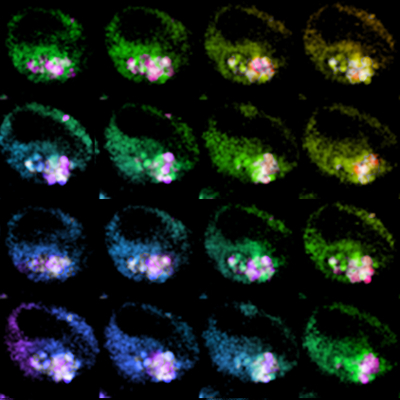Dividing cells fix damaged DNA in nuclear PORTs
The research group lead by Professor Helle Ulrich at the Institute of Molecular Biology (IMB) in Mainz, Germany has made a breakthrough discovery in how cells repair damaged DNA during replication. In an article published today in Molecular Cell, they show that damaged DNA is repaired in specialised areas of the nucleus, which they named ‘postreplicative repair territories’, or PORTs.
DNA is frequently exposed to damaging agents that chemically modify its bases, creating DNA lesions. Scientists had assumed that these lesions are repaired in DNA repair centres at the periphery of the cell nucleus. However, it was unclear how cells coordinated this repair with DNA replication. In their latest study, Prof. Ulrich and her colleagues investigated how and where DNA lesions are repaired during replication by labelling Replication Protein A (RPA), a protein which binds to DNA that is actively undergoing repair, with a fluorescent marker. They then monitored the fluorescent RPA signal in dividing yeast cells treated with a drug that induces DNA lesions.
Surprisingly, they found that DNA lesions are repaired in defined areas within the nucleus, rather than at the nuclear periphery, and only after the DNA had been replicated. Prof. Ulrich and her team named these repair regions ‘postreplicative repair territories’, or PORTs. This finding shows that cells keep their DNA repair machinery well away from replication machinery and advances our understanding of how cells cope with damaged DNA during replication. Understanding how DNA lesions are repaired could also provide a mechanistic basis on which new anti-cancer drug therapies could be designed in the future.
For the full press release, click here.
Further details
About the Institute of Molecular Biology gGmbH
The Institute of Molecular Biology gGmbH (IMB) is a centre of excellence in the life sciences that was established in 2011 on the campus of Johannes Gutenberg University Mainz (JGU). Research at IMB focuses on three cutting-edge areas: epigenetics, developmental biology, and genome stability. The institute is a prime example of successful collaboration between a private foundation and government: The Boehringer Ingelheim Foundation has committed 154 million euros to be disbursed from 2009 until 2027 to cover the operating costs of research at IMB. The State of Rhineland-Palatinate has provided approximately 50 million euros for the construction of a state-of-the-art building and is giving a further 52 million in core funding from 2020 until 2027. For more information about IMB, please visit: www.imb.de.
Boehringer Ingelheim Foundation
The Boehringer Ingelheim Foundation is an independent, non-profit organization committed to the promotion of the medical, biological, chemical, and pharmaceutical sciences. It was established in 1977 by Hubertus Liebrecht (1931–1991), a member of the shareholder family of the company Boehringer Ingelheim. With the Perspectives Programme “Plus 3” and the Exploration Grants, the foundation supports independent junior group leaders. It also endows the internationally renowned Heinrich Wieland Prize as well as awards for up-and-coming scientists. In addition, the Foundation is donating a total of 154 million euros from 2009 to 2027 to the University of Mainz for the Institute of Molecular Biology (IMB). Since 2013, the Foundation has been providing a further 50 million euros for the development of the life sciences at the University of Mainz.
Press contact for further information
Dr Ralf Dahm, Director of Scientific Management, Institute of Molecular Biology gGmbH (IMB), Ackermannweg 4, 55128 Mainz, Germany. Phone: +49 (0) 6131 39 21455, Fax: +49 (0) 6131 39 21421, Email: press(at)imb.de
